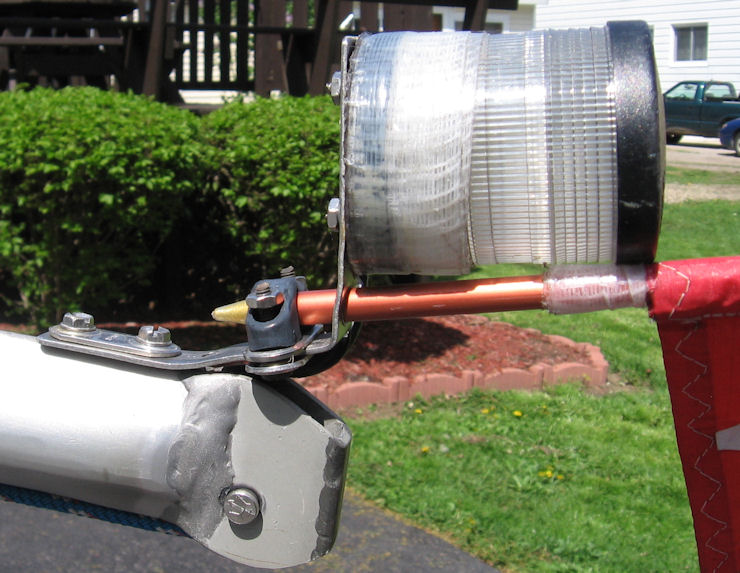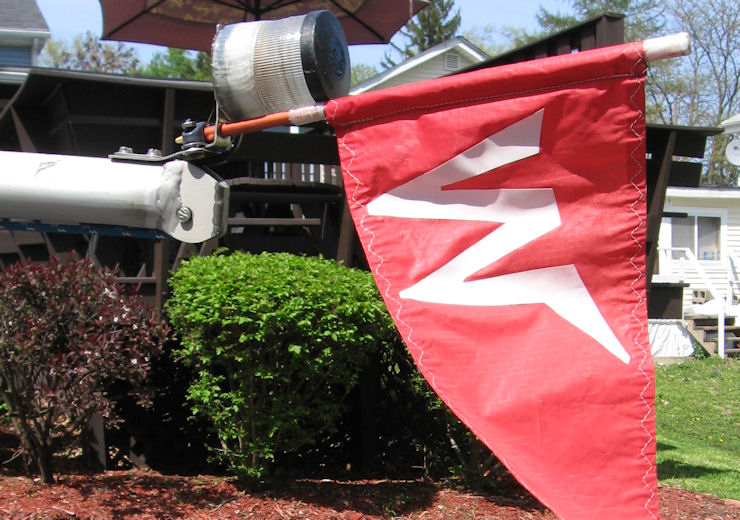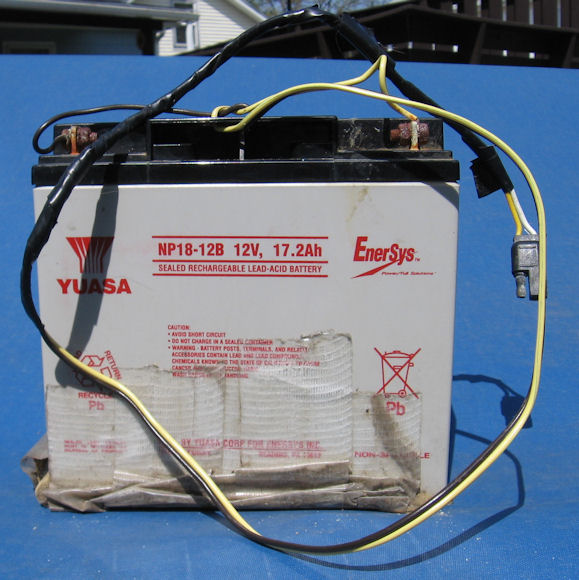| Subject: lighting the night-time
Wayfarer - a query from Cyprus brings a variety
of responses -----
Original Message -----
From:
Richard in Cyprus (W5386)
To:
Al Schonborn
Sent:
Saturday, April 25, 2009 10:26 AM
Subject:
Navigation Lights on a
Wayfarer
Looking through the new home of the WIT, I cannot see anything related to navigation lights for a Wayfarer. Last year by accident on a day cruise [part over-estimated time for the trip, partly forgot about a clock change] I ended up sailing/motoring by night. It actually looks enjoyable to do some sailing by night - over the winter I did my RYA Day Skipper Course and part of the practical involved about 3-4 hours of night sailing which was very enjoyable so want to do the same with my Wayfarer this summer. Apart from the ambiguity in ColRegs over navigation lights for small boats the size of a Wayfarer [which I won't touch] I am thinking of tricolour masthead and separate white steaming/anchor light. In each case what I'm thinking of is the Nasa Supernova LED lights mounted on top of a pole slightly shorter than a whisker pole, with guides that would fit into the mainsail mast track - thus when hoisted, the light should be oriented correctly by the sail track. The pole would have some sort of mounting to take the shackle from the main halyard and at the bottom of the pole another shackle to take the mainsail. Thus the Nav lights would be on a pole which in turn means that the mainsail would always have to be reefed [not a bad idea for night sailing in a Wayfarer in my opinion]. Then I am also thinking of putting 2 or maybe 3 self-lighting keyrings on the boom so that crew and helm are aware of where the boom is when it's dark. As I said... I haven't seen anything in WIT about sailing by night. are there any articles about this? Regards Richard -----
Original Message -----
From:
Al Schonborn
To:
Richard
Cc:
Ken Jensen (W1348) ; Ton Jaspers (W10445) ; Ralph Roberts W9885 ; Dick
Harrington W887
Sent:
Sunday, April 26, 2009 12:26 PM
Hi, Richard:
You are right. The WIT
has no navigation lights information - yet! You are the first one who
has raised the matter. I will copy a few of my favourite resource
people who should be able to give informed views. Then we can add the
results to the WIT. My own navigation lights knowledge is nil, I'm
afraid.
Best regards,
Uncle Al (W3854)
PS: Where do you sail?
In the UK, I assume, given that you did an RYA course. My home base is
just west of Toronto, Ontario in Lake Ontario.
Original
Message -----
From:
Richard
To:
Al Schonborn
Sent:
Sunday, April 26, 2009 2:42 PM
On 26 Apr 2009, at 19:26, Al
Schonborn wrote:
I was quite surprised there was little about sailing by
night in the cruising section. I did eventually find one sentence in
the Philips cruising book, saying According
to Canadian Coast Guard Boating Handbook, these lights are not required
by boats under 7 metres long; but a white light must be shown in the
direction of an approaching vessel "in time to prevent a collision".
But this is Canadian Coast Guard rather than International ColRegs, and
it is exactly the ambiguity I referred to.
We can do RYA courses here in Cyprus quite easily - they are
preferred over the Greek sailing courses. Actually the Greek courses
seem to have better books, but the RYA courses are better overall.
Since I don't speak Greek, the Greek courses would have been
useless to me!
Kind regards
Richard
... Ton Jaspers suggestions with Richard's responses: Original
Message -----
From:
Richard
To:
Wayfarer
Cc:
'Al Schonborn' ; 'Ken Jensen
(W1348)' ; 'Ralph Roberts W9885' ; 'Dick Harrington W887'
Sent:
Sunday, April 26, 2009 3:39 PM
On 26 Apr 2009, at 20:56,
Wayfarer (Ton Jaspers) wrote:
Yep, already have the topping lift... I'll add an extra use for your list... for taking masthead photographs... [see http://wayfarer-cyprus.blogspot.com/2008/11/1-november-2008-unexpected-night-sail.html which is the story of my first night sail but also includes a masthead photograph using the topping lift]
A lot; but I've managed to abuse my Maglite enough for it to
stop working... but then I've used my Maglite for years in the TV
industry... and this one has done about 15 years I think!
I'm often crossing a harbour entrance in Larnaca and in
Limassol [where I did my RYA Day Skipper Course] I was sailing in a VTS
where they are pretty strict.
I would do the same with a bright torch too. However,
as my son [an Able Seaman on a 6,000 tonne ship and who does night
watches] pointed out to me, depending on how bright the torch is that
possibly wouldn't do the night vision of the watchkeeper on the ships
much good. Hailing the ship on VHF channel 16 would probably be
useful... now if only my VHF would do AIS also so that I can get their
MMSI that would be even easier ;-)
I was not so concerned about the horizontal angle of the LED
lights - which are designed for yachts heeling over anyway - but the
way to keep a tricolour vertically oriented, hence my thought of a pole
with fittings into the mast track hoisted above the main sail and only
sail reefed.
I agree with the KISS - simple solutions on a Wayfarer. The
problem with a single light hoisted as you suggest which, while
complying with ColRegs 25 (d)(i), is ambiguous and could also imply the
Wayfarer is complying with ColRegs rule 23 (d)(i) ie is a motor vessel
rather than a sail vessel. One thing our Day Skipper course was quite
strict on was the different rules between different types of vessel...
as the Ousso disaster showed... especially after dark. If we want to
comply, we should be following rule 25 (d)(i) which suggested IF
PRACTICABLE a 3 way light OTHERWISE a torch or lighted lantern showing
a white light. So although it's quite OK to do the simple hoisted white
light but would create exactly the ambiguity we wish to avoid of
being a thought of as a motor vessel.
There is some discussion at the moment [following the Ousso
disaster] about 'defensive sailing' and I have discussed this with some
commercial captains who are not all that happy with the concept of
'defensive sailing' as it creates exactly the ambiguity ColRegs seeks
to make clear. Despite that, I think I would tend towards 'defensive
sailing', which was actually what we did on the RYA practical course
anyway!
Kind regards
Richard
... and from Ralph Roberts: -----
Original Message -----
From:
Ralph Roberts
To:
Richard
Cc:
'Al Schonborn' ; 'Ken Jensen
(W1348)' ; 'Dick Harrington W887' ; Wayfarer
Sent:
Monday, April 27, 2009 4:22 AM
Richard,
I'm not sure my imput to this
discussion will be of great value, since you are obviously far more
aware of the official regulations than I am. I always understood that
an all-round white light is all that is needed for a 5m vessel like a
Wayfarer, and is therefore all that I have used on each of my North Sea
crossings. It was a standard 12v light designed for yachts, for which I
made a special fitting to (permanently) fix it to the very top and
front of the mast, and I powered with a m/cycle battery, secured to the
base of the mast. If I were doing another trip, I would certainly look
into using LED lights, since this would save adding a heavy 12v
battery to the already considerable amount of gear that is loaded
aboard for such a trip.
With regard to the defensive
sailing issue, this is always something that I have practised, but I do
make sure I make an obvious change of course away from the impending
collision route, so that the ship is aware that I am taking the
responsibility for avoiding a collision.
As I try to file all
correspondence, it would help me if you could let me have your surname,
together with the country you are based, if it is not in the UK. As the
International rep, it is certainly helpful for me to know of any
overseas contacts.
Best wishes, Ralph Richard L. responded: Last year I had an argument with one of the glass-bottom
tourist boats in the bay. I was stand-on boat under sail, but they
under power, and with no restricted navigation problems just loudly
used their horn to tell me to get out of their way... which I did since
they were making it obvious they had no intention of changing course...
to roars of laughter from the drunken passengers on the boat. Moral:
Never debate ColRegs with a boat load of drunks!
Best wishes, Richard
-----
Original Message -----
From:
Richard Harrington
To:
Ralph Roberts ; Richard
Cc:
Al Schonborn ; Ken Jensen
(W1348) ; Wayfarer
Sent:
Monday, April 27, 2009 3:13 PM
Richard,
I'm in solid agreement with Ralph, having mostly done my night sailing on the Chesapeake Bay and the Great Lakes, plus having used the masthead light when anchored where there might be night-time power boat traffic. For Wayfarer-size sailing vessels, the 360° white mast head light is legal in the US. Even motoring, I would do the same -- though technically it is not legal. Simplicity is very important when cruising.   The clear globe is mounted on an SS angle bracket at the top forward face of the mast. I recently replaced the guts with a clear LED lamp. The wire runs inside the mast, exiting at the base and has a simple 2-prong automotive type connector that mates with a connector on the 12V-battery. No switches to corrode! Just connect the leads when needing the light. Keep a dummy connector on the battery lead for protection when not in use.  I use a long-lasting, totally sealed hi-tech battery that is designed for use in hospitals for backing up critical electronic monitoring systems. They are very compact and last for many years! DICK Richard responds: Makes sense - and was one of the ideas I started with but
had discarded because of not being able to be seen from the stern.
There's a fair amount of fishing boat traffic about round here,
so a single 360 would generally get thought of as a motorised fishing
boat. However, it sounds the easiest to rig permanently and have
available. Sounds reasonably economic, too. Did you use one of those
masthead lights that normally takes a festoon bulb but can be replaced
with a LED festoon?
Do you use a radar reflector too?
Richard
Dick: The original light fixture was a cheap plastic device intended for small boats. I bought the 360° white for the masthead and a combination red/green to attach in front of the mast. They took 12V bulbs. (Normal yacht lighting fixtures are pricey and not really suitable for a 16-foot sailboat.) Very quickly, I abandoned the red/green....too complicated. The bulbs were always a problem because of vibration when traveling on the road....mostly they would fall out of the socket--they weren't screw-in type bulbs. Later I found an LED lamp fixture in an automotive store that I disassembled and was able to re-fasten inside the cheap plastic fixture--can remember the minute details now. I figured if LED's work in trailer lights, I'd give it a try. At night the light looks pretty bright to me....much better than the old situation when I never knew if the light would show up. If I had to make a choice between a radar reflector and night lights, I would go radar reflector. The bigger boats are going to see the radar reflector before lights. The small high speed night time drunks aren't going to see either one...you're screwed regardless. DICK |